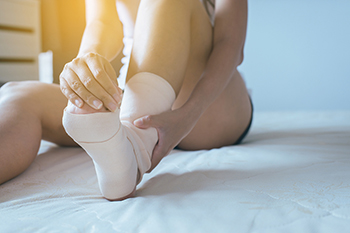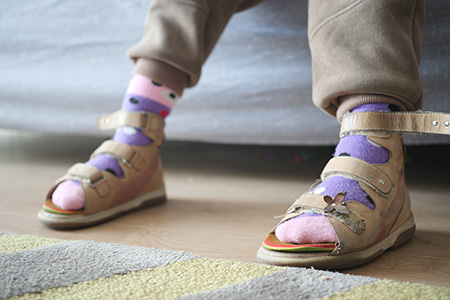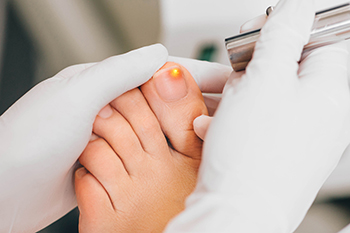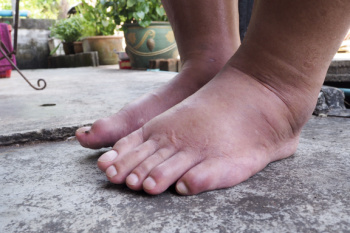






Athlete's foot is a common fungal infection that affects the skin on the feet. During pregnancy, hormonal changes can increase the likelihood of developing athlete's foot. Hormones such as progesterone cause changes in sweat production, leading to a warmer and more humid environment in the shoes, which is ideal for fungal growth. Poor foot hygiene during pregnancy can also contribute to this condition. As pregnancy progresses, some women may struggle to maintain proper foot care, leading to an increased risk of infections. Additionally, staying barefoot too much can expose the feet to the fungi responsible for athlete's foot, as bare feet are more susceptible to infections in public areas like swimming pool or gym locker rooms. If you are pregnant and have developed athlete’s foot, it is suggested that you consult a podiatrist who can effectively treat this uncomfortable condition.
Pregnant women with swollen feet can be treated with a variety of different methods that are readily available. For more information about other cures for swollen feet during pregnancy, consult with one of our podiatrists from Active Foot and Ankle Care, LLC. Our doctors will attend to all of your foot and ankle needs.
What Foot Problems Can Arise During Pregnancy?
One problem that can occur is overpronation, which occurs when the arch of the foot flattens and tends to roll inward. This can cause pain and discomfort in your heels while you’re walking or even just standing up, trying to support your baby.
Another problem is edema, or swelling in the extremities. This often affects the feet during pregnancy but tends to occur in the later stages.
How Can I Keep My Feet Healthy During Pregnancy?
If you have any questions please feel free to contact our offices located in Fair Lawn, Riverdale, and Englewood, NJ . We offer the newest diagnostic and treatment technologies for all your foot and ankle needs.

Rain or shine, snow or sleet, Custom Orthotics have your feet covered! As the seasons change, ensure your steps remain comfortable and supported. Custom Orthotics adapt to your footwear, from summer sandals to winter boots, providing consistent relief and alignment. Don't let the changing weather dictate your foot comfort. Step confidently year-round and experience the difference with Custom Orthotics. Call today for more information.
 Osteoporosis weakens bones, making them more prone to fractures, including those in the feet, toes, and ankles. A stress fracture in the foot, especially one that occurs with minimal impact or no clear cause, may be an early warning sign of this condition. Since osteoporosis, more common among women, reduces bone density, routine activities like walking or standing for long periods can lead to small, repetitive injuries that result in foot fractures. Women with this condition are particularly vulnerable to stress fractures in the metatarsals, which are the long bones in the foot that bear weight. Symptoms include pain, swelling, and difficulty walking. A podiatrist can assess the extent of the injury and recommend appropriate treatment options, which may include immobilization, supportive footwear, or surgery in severe cases. Identifying osteoporosis-related fractures early can help prevent further complications and support long-term foot health. If you have incurred a foot stress fracture, it is suggested that you schedule an appointment with a podiatrist for an exam and appropriate treatment.
Osteoporosis weakens bones, making them more prone to fractures, including those in the feet, toes, and ankles. A stress fracture in the foot, especially one that occurs with minimal impact or no clear cause, may be an early warning sign of this condition. Since osteoporosis, more common among women, reduces bone density, routine activities like walking or standing for long periods can lead to small, repetitive injuries that result in foot fractures. Women with this condition are particularly vulnerable to stress fractures in the metatarsals, which are the long bones in the foot that bear weight. Symptoms include pain, swelling, and difficulty walking. A podiatrist can assess the extent of the injury and recommend appropriate treatment options, which may include immobilization, supportive footwear, or surgery in severe cases. Identifying osteoporosis-related fractures early can help prevent further complications and support long-term foot health. If you have incurred a foot stress fracture, it is suggested that you schedule an appointment with a podiatrist for an exam and appropriate treatment.
A broken foot requires immediate medical attention and treatment. If you need your feet checked, contact one of our podiatrists from Active Foot and Ankle Care, LLC. Our doctors can provide the care you need to keep you pain-free and on your feet.
Broken Foot Causes, Symptoms, and Treatment
A broken foot is caused by one of the bones in the foot typically breaking when bended, crushed, or stretched beyond its natural capabilities. Usually the location of the fracture indicates how the break occurred, whether it was through an object, fall, or any other type of injury.
Common Symptoms of Broken Feet:
Those that suspect they have a broken foot shoot seek urgent medical attention where a medical professional could diagnose the severity.
Treatment for broken bones varies depending on the cause, severity and location. Some will require the use of splints, casts or crutches while others could even involve surgery to repair the broken bones. Personal care includes the use of ice and keeping the foot stabilized and elevated.
If you have any questions please feel free to contact our offices located in Fair Lawn, Riverdale, and Englewood, NJ . We offer the newest diagnostic and treatment technologies for all your foot and ankle needs.

Flexible flat feet in school-age children can lead to discomfort, pain, and difficulty with physical activities. Research highlights that pediatric symptomatic flexible flatfoot can significantly improve with the use of custom insoles over a two-year period. These specialized orthotics provide support to the arch, improving foot alignment and relieving symptoms such as pain and fatigue. For children aged six and older, insole treatment emerges as a practical option, potentially reducing the need for invasive interventions later. Beyond symptom relief, insoles may enhance a child’s overall mobility and confidence. While flexible flat feet are common in younger children and often resolve naturally, persistent symptoms warrant professional evaluation. If you have a child with foot pain, it is suggested that you consult a podiatrist to ensure a proper diagnosis and tailored treatment plan to address your child’s specific needs.
Discover relief from persistent foot pain with custom orthotics and shoe inserts. If you’re battling heel pain, these personalized solutions offer targeted support, addressing the root causes of discomfort. Customized to your unique biomechanics, these inserts provide stability, alleviating both heel and foot pain. Say goodbye to the agony of every step and hello to a life free from constant foot pain. Invest in your well-being with custom orthotics or shoe inserts ensuring your feet receive the care they deserve. Step confidently, step comfortably – because a pain-free journey begins with the right support.
If you have any questions please contact our offices located in Fair Lawn, Riverdale, and Englewood, NJ . We offer the newest diagnostic and treatment technologies for all your foot and ankle needs.

Laser treatment for fungal toenails is an advanced therapy that uses focused light to target and destroy fungal infections under the nail. The procedure is non-invasive, meaning there is no need for cuts or incisions, making it a more comfortable alternative to traditional treatments. It is also largely painless, with most patients reporting only mild warmth or slight discomfort during the session. One of the key benefits of laser treatment is that it carries little to no risk of side effects, unlike some oral medications that can cause adverse reactions. However, the success of the treatment depends largely on the severity of the infection. In mild cases, a single session may be enough, but more extensive infections could require multiple treatments to achieve optimal results. If you have toenail fungus and are considering this form of treatment, it is suggested that you consult with a podiatrist to assess your specific condition and determine the most appropriate course of action.
Laser treatment can be an effective way to get rid of toenail fungus. If you have any questions about laser treatment, consult with one of our podiatrists from Active Foot and Ankle Care, LLC. Our doctors will assess your condition and provide you with quality treatment for fungal nails.
What Are Toenail Fungal Infections?
Onychomycosis, or fungal infection of the nail, is a relatively common and non-serious condition. Around 10 percent of U.S. citizens are afflicted with fungal nails. Common forms of fungus that infect the nail include dermatophytes, yeasts, and molds.
Symptoms of Toenail Fungal Infections Include:
Diagnosis for Fungal Nails
Fungal infections are diagnosed by fungal culture and microscopy. This will rule out any other conditions such as nail trauma, psoriasis, lichen planus, and onychogryphosis.
What Is Laser Treatment?
Laser treatment is a non-invasive, safe, quick, and painless procedure that uses the heat from a laser to kill fungus in the nail. Each infected nail is targeted with a laser for several minutes. The treatment is usually utilized several different times over a select period. During this time, a podiatrist will keep an eye on the infection.
If you have any questions, please feel free to contact our offices located in Fair Lawn, Riverdale, and Englewood, NJ . We offer the newest diagnostic and treatment technologies for all your foot care needs.

Kidney disease can increase the risk of foot problems due to its impact on circulation and nerve health. Poor kidney function can lead to fluid retention, causing swelling in the feet and ankles. It also raises the risk of peripheral neuropathy, where nerve damage reduces sensation, making it harder to notice injuries. Wounds and infections may heal more slowly, increasing the chances of serious complications like ulcers. To protect your feet, inspect them daily for cuts, blisters, or swelling. Keep your feet clean, moisturized, and avoid walking barefoot to prevent injuries. Choose well-fitting shoes that provide support and reduce pressure points. If you experience pain or notice any unusual changes to your feet, it is suggested that you promptly see a podiatrist. This type of doctor can provide specialized care to prevent complications and help you maintain healthy, functional feet despite kidney disease.
When dealing with systemic disease of the feet, it is extremely important to check the affected areas routinely so that any additional problems are caught quickly. If you have any concerns about your feet and ankles contact one of our podiatrists from Active Foot and Ankle Care, LLC. Our doctors will assist you with all of your podiatric needs.
Systemic Diseases of the Feet
Systemic diseases affect the whole body, and symptoms usually are displayed in the feet. This condition can make a patient’s ability to walk unbearable. Systemic diseases include gout, diabetes mellitus, neurological disorders, and arthritis.
Gout – is caused by an excess of uric acid in the body. Common symptoms include pain, inflammation, and redness at the metatarsal/phalangeal joint of the base big toe. Gout can be treated by NSAIDs to relieve pain and inflammation, and other drugs that lower the acid levels in the body.
Diabetes mellitus – is an increase in the level of blood sugar that the body cannot counteract with its own insulin. Failure to produce enough insulin is a factor in Diabetes.
Diabetes of the Feet
Diabetic Neuropathy – may lead to damaged nerves and affect the feet through numbness and loss of sensation.
Peripheral Vascular Disease – can restrict the blood flow to the feet, and often times lead to amputation of the feet.
If you have any questions please feel free to contact our offices located in Fair Lawn, Riverdale, and Englewood, NJ . We offer the newest diagnostic and treatment technologies for all your foot and ankle needs.






